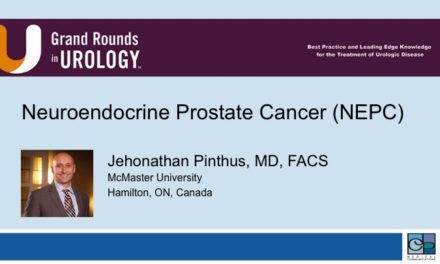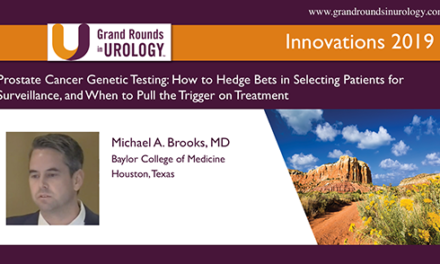Steven E. Finkelstein, MD, presented “Emerging Technology in Radiation Oncology: Indications for a Novel Absorbable Hydrogel Spacer” during the 19th Annual Future Directions in Urology Symposium on August 11, 2018 in Colorado Springs, Colorado.
How to cite: Finkelstein, Steven E. “Emerging Technology in Radiation Oncology: Indications for a Novel Absorbable Hydrogel Spacer” August 11, 2018. Accessed [date today]. https://grandroundsinurology.com/emerging-technology-in-radiation-oncology-indications-for-a-novel-absorbable-hydrogel-spacer/
Emerging Technology in Radiation Oncology: Indications for a Novel Absorbable Hydrogel Spacer – Summary:
Steven E. Finkelstein, MD, FACRO, provides a brief update on hydrogel spacers to minimize toxicity to the rectum from prostate radiotherapy, as well as a novel hydrogel technology for multiple disease sites.
PEGylated Hydrogel Spacer (Brand Name SpaceOAR)
SpaceOAR is an implant consisting of water and polyethylene glycol (PEG) placed between the rectum and the prostate. This temporarily moves the rectum about 1.3 cm away from the prostate while a patient receives radiotherapy, . This technology decreases the radiation dose to the rectum and the grade 1 rectal toxicity rate by about 75%. Protecting the rectum from the field of radiation with this technology provides long-term quality of life benefits for patients. An additional novel hydrogel technology may also have utility in other disease sites, including the bladder.
About Dr. Finkelstein
Dr. Finkelstein is the Cancer Center Director at Bay Regional Cancer Center and Chair of Research at Advanced Urology Institute. He is particularly experienced in the field of radiation oncology, serving as the National Principal Investigator of the Radiation Therapy Oncology Group (RTOG/NRG) and Vice Chairman of Translation Research for Southwest Oncology Group (SWOG) Radiation Committee, among other accomplishments involving radiotherapy. Therefore, he has specific expertise regarding minimizing side effects and rectal toxicity of prostate radiotherapy.
About the Future Directions in Urology Symposium
The Future Directions in Urology Symposium (FDUS) is an annual collaborative meeting with a faculty consisting of the top researchers, physicians, and educators in the field of urology. During FDUS, experts provide updates on recent developments and debate innovative management approaches in genitourinary cancers and urologic conditions. Subsequently, the experts devise consensus statements in accordance with the discussions held in the meeting.
In this video, Dr. Finkelstein discloses the thesis of the discussion he led during FDUS.
ABOUT THE AUTHOR
Steven E. Finkelstein, MD, FACRO, is the Director of the Center of Advanced Radiation Excellence, and Director of Radiation Oncology Research for Associated Medical Professionals in Syracuse, New York. His interests include the research of a variety of cancers, busting radiation driven, and personalized systemic therapy. He holds three international patents in the field of cutting edge technologies.
Dr. Finkelstein received his medical degree from the University of Michigan Medical School, graduating cum laude eruditions causa. He then joined the National Cancer Institute, National Institutes of Health as Clinical Associate. He completed both Surgical Oncology Fellowship as well as Clinical Immunotherapy Fellowship, and an additional radiation oncology residency.
He served a residency in General Surgery at Washington University in Saint Louis, Missouri, Dr. Finkelstein also served fellowships in Biologic Immunotherapy, Clinical Cancer, and Surgical Oncology at the Surgery Branch of the National Cancer Institute in Bethesda, Maryland. He is a member of the American College of Radiation Oncology, the American Medical Association, the American Society of Clinical Oncology, the American Society for Therapeutic Radiology and Oncology, the Radiological Society of North America, and the Radiation Therapy Oncology Group.
He has served as a Co-Chair on the NRG Immunotherapy Committee, Co-Chair of the 2018-2019 ACRO Scientific Program Committee, and Chair of the SWOG Radiation STG Committee. He currently serves on the Board of Chancellors for ACRO. Dr. Finkelstein has also served as National Director of Translational Research Consortium (TRC), the cutting-edge therapy arm of 21st Century Oncology in Scottsdale, Arizona. Inspired by his grandmother, a cancer patient, he became a dedicated cancer surgeon who found that radiation therapy could sometimes do for his patients what surgery could not.




